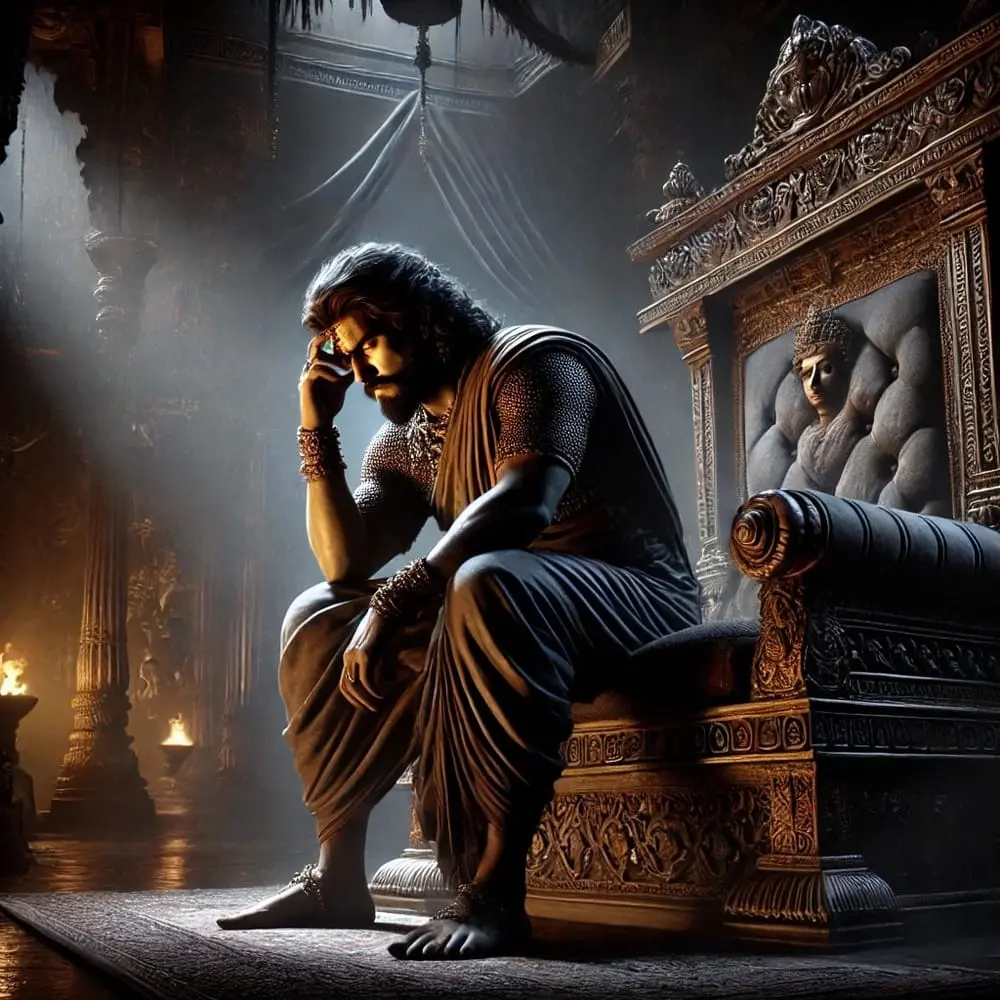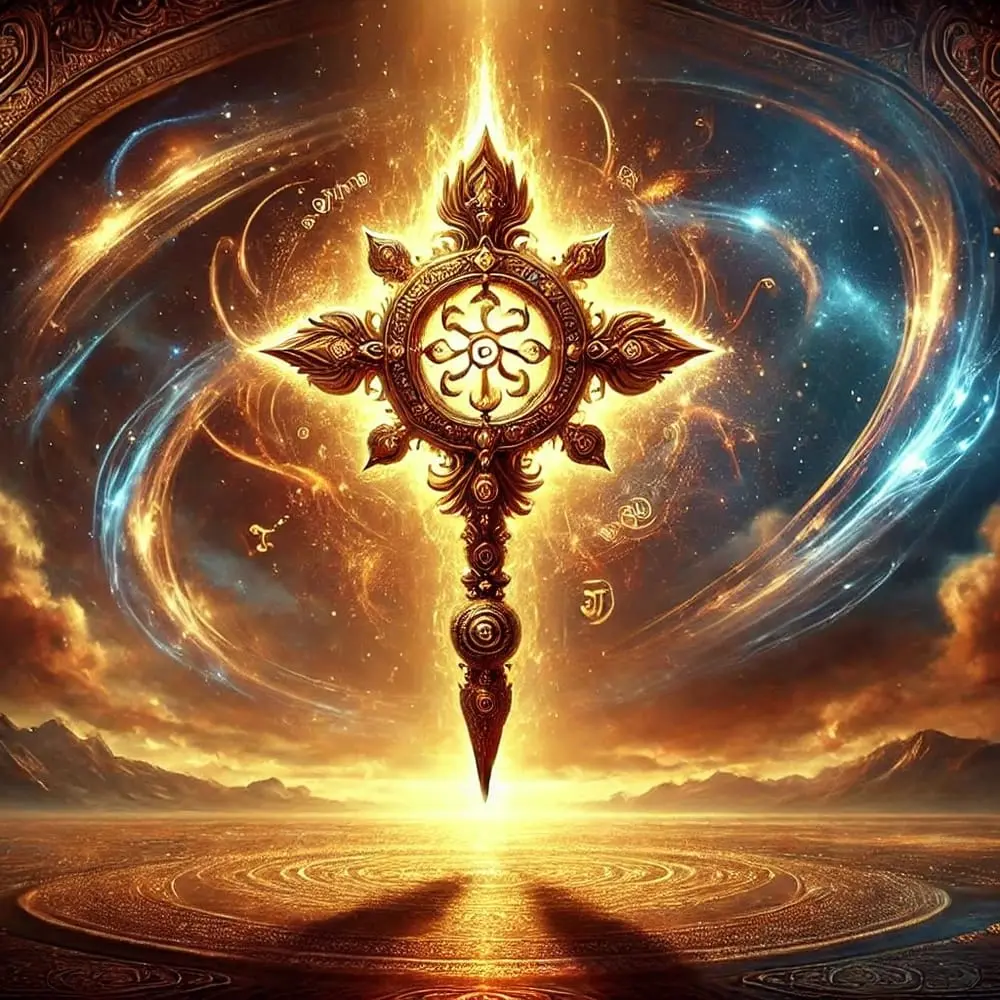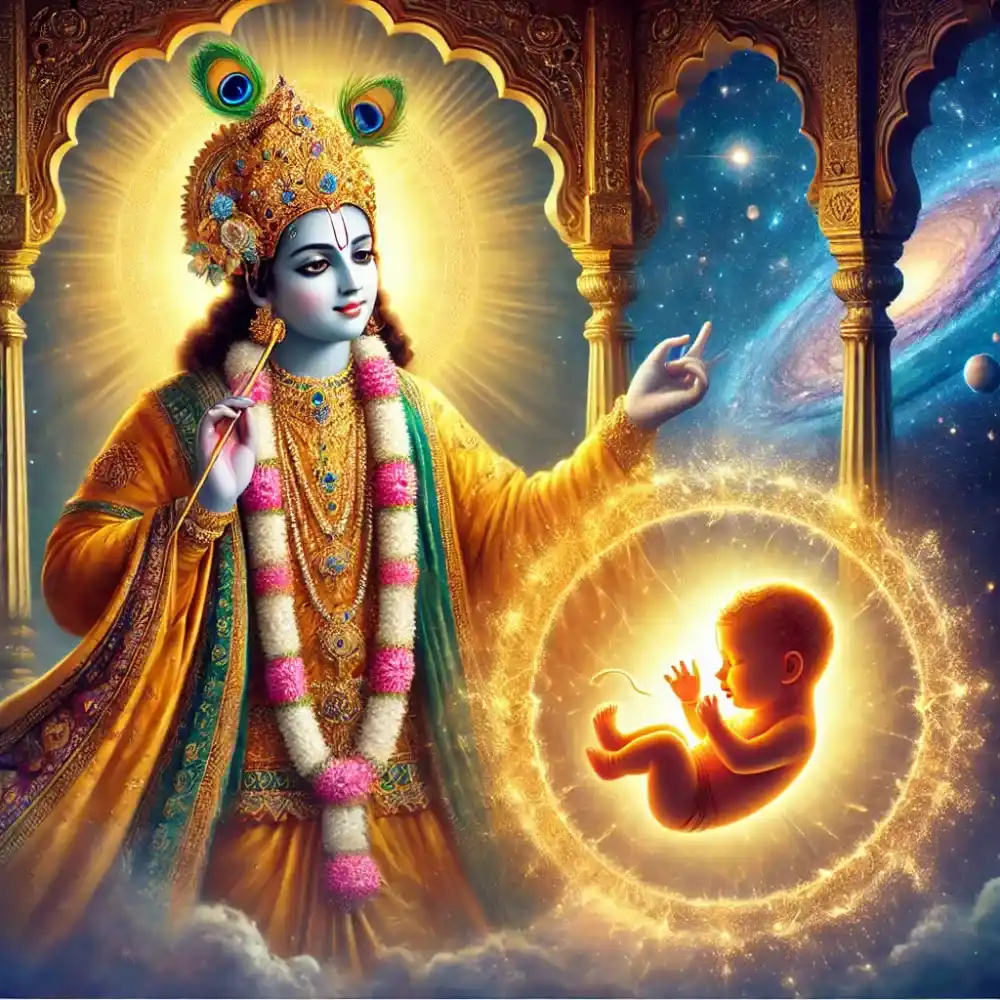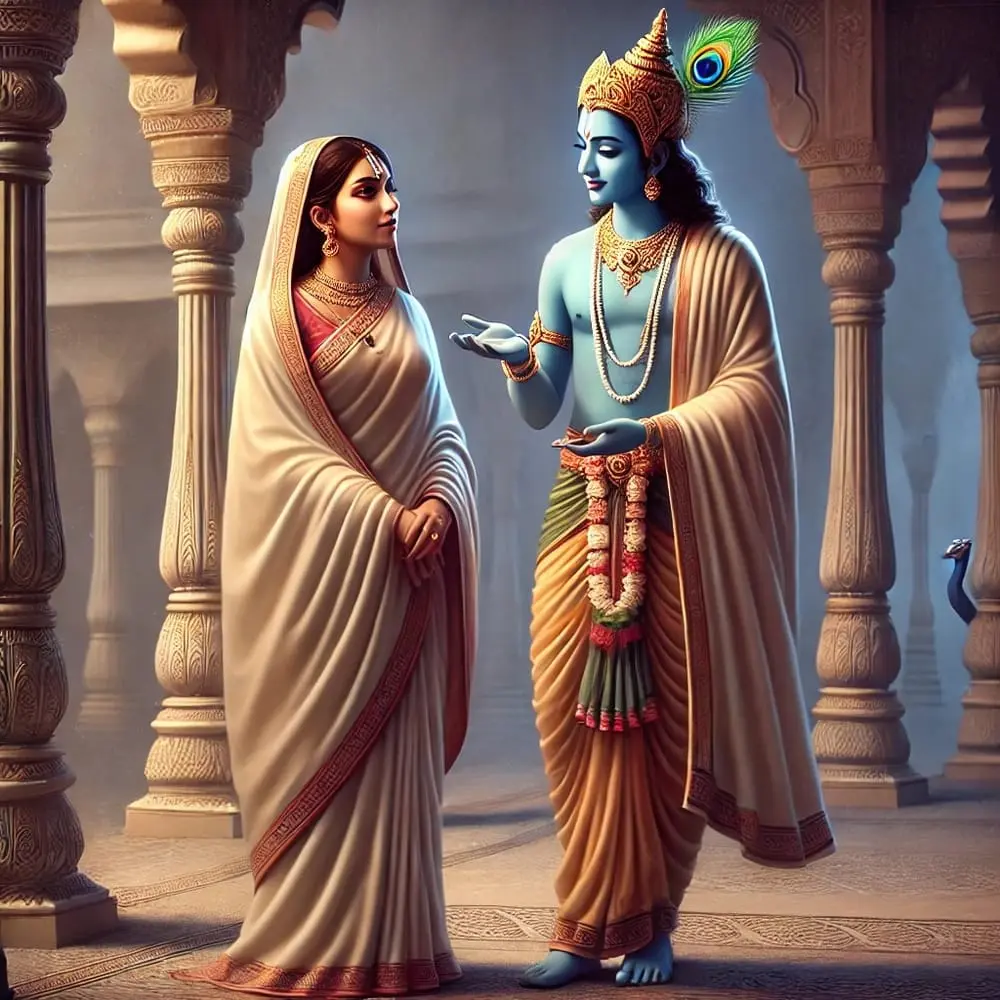In the vast expanse of ancient scriptures, Ved Vyas penned the Srimad Bhagavatam, inspiring detachment and spiritual elevation for generations. Driven by a thirst for meditation on the personal form of God, Shukadev went to Ved Vyas, who narrated the Srimad Bhagavatam to him, transforming Shukadev into the great speaker, or Vakta, of the Srimad Bhagavatam later on. Parikshit, the grandson of Arjun, became the perfect listener for the profound teachings of the Srimad Bhagavatam.
The Mahabharat war ended in a bittersweet victory for the Pandavas, following a devastating war that resulted in massive loss of life. With most warriors on both sides dead, the aftermath continued to be filled with violence, vengeance, and unresolved emotions. This blog explores the events that unfolded after the Mahabharat, including Parikshit's journey before his birth.
The Story of Ashwathama and the Power of Forgiveness
Ashwathama’s Desperation and the Tragic Mistake
After the great battle of Kurukshetra, Duryodhan was deeply enraged and overwhelmed by the outcome, so he sat in a lake trying to cool his burning frustration. Ashwathama, the son of guru Dronacharya, was eager to please Duryodhan and decided to take a treacherous route. He entered the Pandavas' tent at night, intending to murder them while they slept. However, Shree Krishna had already intervened, guiding the Pandavas to sleep in a different tent which led to their children sleeping in the tent that Ashwathama entered. Ashwathama, mistaking the children for the Pandavas, decapitated them in the darkness of the night and brought their heads to Duryodhan. Proudly, he presented them as the heads of the Pandavas.
Duryodhan couldn't believe it and specifically asked for Bhim's head. After receiving the largest head, he crushed it, carefully inspected it and realized that these were the heads of his nephews, not the Pandavas. Shocked and disheartened by Ashwathama's actions, Duryodhan expressed his frustration, realizing that wiping out the entire dynasty in such a manner was futile.

Arjun’s Pursuit and Resolve
The following morning, when Draupadi went to serve her husbands, she found the bodies of her children and let out a heart-wrenching scream. Draupadi’s scream brought the Pandavas to the scene. Upon seeing the death of their children and witnessing Draupadi’s grief, Arjun was filled with intense anger and made a firm resolve to punish the one responsible for this atrocity.
He immediately set off, with Shree Krishna by his side, and the two began to chase after Ashwathama. Realizing they were behind him, Ashwathama knew his fate was sealed. Though he had mastered the release of the Brahmastra, the ancient weapon ignited through powerful mantras and equivalent to nuclear weapons, Ashwathama did not know how to recall it. In desperation, he released the Brahmastra targeting Arjun, and as it descended the universe grew darker. Arjun, startled by the ominous noise and fear, sought Shree Krishna's protection. Shree Krishna reassured him that there was no need to fear and instructed him to release another Brahmastra. Arjun followed Shree Krishna’s instructions, releasing his own Brahmastra, and the two weapons collided in mid-air, canceling each other out. He then withdrew both Brahmastras, swiftly caught up with Ashwathama, seized him, and dragged him back to Draupadi, declaring that he had brought the murderer of their children and would kill him.

Draupadi’s Moment of Compassion
Draupadi, showing immense compassion and forgiveness, urged Arjun not to fight, as she understood the pain of losing a child and did not want Ashwathama's mother to endure the same suffering. Bhim, however, insisted that Ashwathama, as a murderer, deserved to die. Yudhishthir also spoke, urging forgiveness.
Arjun, seeking guidance, turned to Shree Krishna for a resolution. Shree Krishna spoke with wisdom, stating that a person who kills treacherously should be punished, but the son of a Brahmin should not be killed. Arjuna initially wondered if Shree Krishna was being diplomatic, sitting on the fence, but then understood his deeper intention. He would punish Ashwathama but not take his life. Arjun then removed the jewel from his head, which symbolized his status, and shaved off Ashwathama’s sacred tuft of hair—the shikha—an act of dishonor. This act would kill his prestige which was as good as taking his life.
Ashwathama’s Revenge and Repercussions
Ashwathama, after being released, ran away, but his evil nature led him to make another grave mistake. In a fit of vengeance, he released the Brahmastra once again, this time targeting Arjuna’s unborn grandson. Abhimanyu had been killed in the battle and his wife, Uttara, was pregnant with their child at the time. As the Brahmastra approached, Uttara, in fear and desperation, prayed to Shree Krishna, requesting him to protect her.
At that moment, Shree Krishna assumed a small form, entered Uttara's womb, neutralized the Brahmastra, and granted his darshan to the child within. This child was later born as Parikshit.

Kunti's Wisdom and Shree Krishna's Stay in Hastinapur
Shree Krishna Prepares to Leave Hastinapur
With Ashwathama's last act of vengeance thwarted, Shree Krishna, who had remained a constant guide throughout these events, decided it was time to leave Hastinapur. The people of Dwarka, his kingdom, were waiting for his return. As Shree Krishna was preparing to depart, Kunti, the mother of the Pandavas, approached him. With a heart full of devotion, she expressed her deep distress at the thought of his leaving, as he was the very source of support for their lives. She prayed to him, asking how they would manage without him.
Touched by Kunti's sincere devotion, Shree Krishna assured her that her devotion had pleased him greatly and invited her to make a request. In a moment of profound wisdom, she requested that he grant her more calamities, hardships, and oppressive circumstances.

Kunti's Profound Wisdom
Shree Krishna looked at Kunti with a thoughtful expression and spoke of the many hardships she had endured throughout her life. He reminded her of her childhood when she had been separated from her father. She had married Pandu, yet found no happiness as a wife, and when he passed away, she became a widow. Then, the suffering only continued—she faced the cruel oppression of Duryodhan, the terrifying experience of the burning wax house, and the public humiliation of her daughter-in-law, Draupadi.
Her trials did not end there. She was forced to spend twelve years in exile, living in the forest with her sons. Yet, despite all this suffering, she persevered. At present, she stood as the mother of Yudhishthir, the current king of Hastinapur. After all she had endured and overcome, he questioned why she would ask for more misfortune when she had already endured so much.
She continued, quoting the wisdom: "To have asha (hope) that I will get happiness in the world is the biggest misery because you will keep running after illusion, and to have nirasha, there is no happiness here, is the biggest blessing because you will turn around and go to God.” Moved by her words, Shree Krishna decided to stay in Hastinapur a little longer.
Conclusion
The story of Ashwathama’s vengeful crime, Arjun’s pursuit of justice, and Kunti’s profound wisdom offers us timeless lessons on dharma, justice, forgiveness, and the path to spiritual realization. While the Mahabharat war may have ended, the aftermath was fraught with challenges and moral dilemmas that continue to resonate in today’s world. Arjun’s journey of vengeance, Draupadi’s compassion, and Kunti’s spiritual insight all highlight the complexities of human emotions and the importance of aligning one’s actions with higher principles of truth and righteousness.
Call to Action
For profound spiritual insights, subscribe to Swami Mukundananda’s YouTube Channel. Learn timeless wisdom from the Srimad Bhagavatam to increase detachment and love for God.
FAQs
1. Why did Ashwathama kill the Pandava children?
Ashwathama killed the Pandavas’ children in an act of revenge and desperation, hoping to avenge the defeat of the Kauravas and please his master, Duryodhan. Mistaking them for the Pandavas, he committed the heinous crime in the dark of the night.
2. Why did Draupadi forgive Ashwathama?
Draupadi displayed extraordinary compassion and forgiveness in the face of immense personal loss. She understood that forgiveness is a spiritual strength and that punishing Ashwathama would perpetuate further violence and suffering.
3. What was Kunti’s prayer to Shree Krishna?
Kunti, after all the suffering she had endured, prayed to Krishna to give her more hardships, recognizing that worldly pleasures are distractions from spiritual growth. Her request reflected her deep devotion and understanding of the transient nature of material life.
4. What is the significance of Shree Krishna’s intervention in Uttara’s womb?
Shree Krishna’s intervention to protect the unborn child of Uttara, Abhimanyu’s widow, symbolizes his divine role as a protector of dharma and a savior in times of crisis. Parikshit, the child saved by Shree Krishna, later played an important role in the Kuru dynasty and as the listener of the Srimad Bhagavatam.
Reading Resources
Who penned the Srimad Bhagavatam?
Who was the speaker of the Srimad Bhagavatam?

